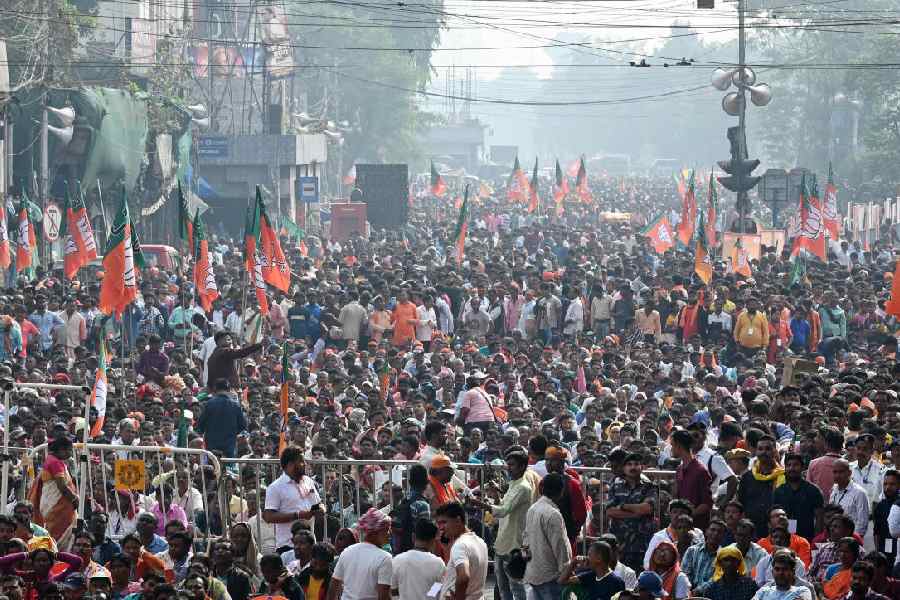Union home minister Amit Shah on Wednesday said no one could stop the implementation of the Citizenship Amendment Act (CAA) before underlining that Bengal chief minister Mamata Banerjee was opposed to it.
"The infiltration is at the extremes here (in Bengal). After the people of Assam brought the BJP government to the state, a bird couldn't even infiltrate... Mamata Banerjee is opposing the CAA. I would like to inform her that CAA is an act in our country and no one can stop this from implementation. I will ensure this," Shah said while addressing a rally of around 60,000 people at Esplanade.
"All my Hindu brothers and sisters who came from outside, they have the same rights that you or I have in this country," he said, making it clear that the CAA would become the mainstay of the BJP's campaign for the Lok Sabha polls in Bengal.
The CAA, passed in the Parliament on December 11, 2019, amended the Citizenship Act of 1955 and it proposed Indian citizenship for Hindu, Sikh, Buddhist, Jain, Parsi and Christian religious minorities, who fled from the neighboring Muslim majority countries of Pakistan, Bangladesh and Afghanistan before December 2014 due to "religious persecution or fear of religious persecution".
Shah also attacked the Mamata government and allege that the Bengal police have shied away from taking action against infiltrators even after having knowledge of illegal immigration.
Shah also spoke about the construction of the Ram Temple in Ayodhya before accusing the Congress and Trinamul of trying to prevent it.
"Should we construct Ram Temple in Ayodhya or not? You tell me in a loud voice whether it is yes or no? This Congress and Mamata Banerjee and others have come under an umbrella to stop the construction of Ram Temple. Modiji started its work in 2019 and he will inaugurate this on January 22, 2024," Shah said.
In its pursuit for power in Bengal — a bordering state with around 30 per cent minority population — the BJP has been trying to build its pre-poll campaigns in the state by focusing on issues like infiltration, the CAA over the last few years as part of its larger gameplan to polarise voters and consolidate Hindu majority votes.
Shah's claims on infiltration and the commitment to roll out CAA were contested by groups at the forefront of the protests against the BJP's plans to divide people along communal lines.
"...Amit Shah raised the bogie of "infiltration" (illegal migration) in West Bengal, criticizing the state government for abetting it. This is strange because border security and management is overseen by the Union home ministry. If there is continuing "infiltration" (illegal migration) in West Bengal, he should immediately tender his resignation rather than blaming others," said Prasenjit Bose, the convenor of the Joint Forum Against NRC, a platform of like-minded organisations that have been protesting against the CAA.
Bose contested the claims made by Shah that people are illegally entering India from Bangladesh, echoing several academics on both sides of the border who have drawn attention to how income opportunities have multiplied in Bangladesh and thus reduced the incentives for illegal immigration to India.
Bose called the "narrative" of large-scale infiltration of illegal migrants from Bangladesh into Bengal "nothing but a bogey being conjured by the BJP to polarise the electorate".
Bose also questioned the intention of the Narendra Modi government, which passed the CAA in 2019 but failed to roll it out even after four years due to a plethora of reasons.
Several BJP insiders said that as the party is planning to pitch the inauguration of the Ram Temple in Ayodhya as the major poll plank before the Lok Sabha polls in 2024, it was natural that Shah would dwell on it.
"Our party has a plan to take a delegation from Bengal to Ayodhya during the inauguration of the Ram temple. The party will also plan several other programmes during that time," said a senior BJP leader.
In his address, Shah also raised several issues such as terrorism, and revoking of Article 370 as he tried to tick all the boxes that are part of the BJP's divisive strategy matrix.
"Modi ji has ended terrorism in the country. You tell me whether Kashmir is part of our country or not? Syama Prasad Mookerjee, a great son of Bengal, sacrificed his life with the dream of revoking Article 370.... Modi ji made it possible," said Shah.
In August 2019, the Narendra Modi government revoked the special status, or autonomy, granted under Article 370 of the Indian Constitution to Jammu and Kashmir, which was opposed by all anti-BJP parties and several social organisations across the country.
"Why shouldn't we claim our success in revoking it in front of the people of Bengal, the state of one of our biggest icons (Mookerjee)?" asked a BJP insider, justifying Shah's pitch on Wednesday.











